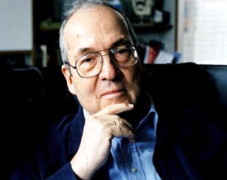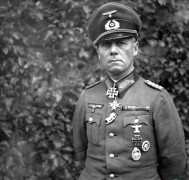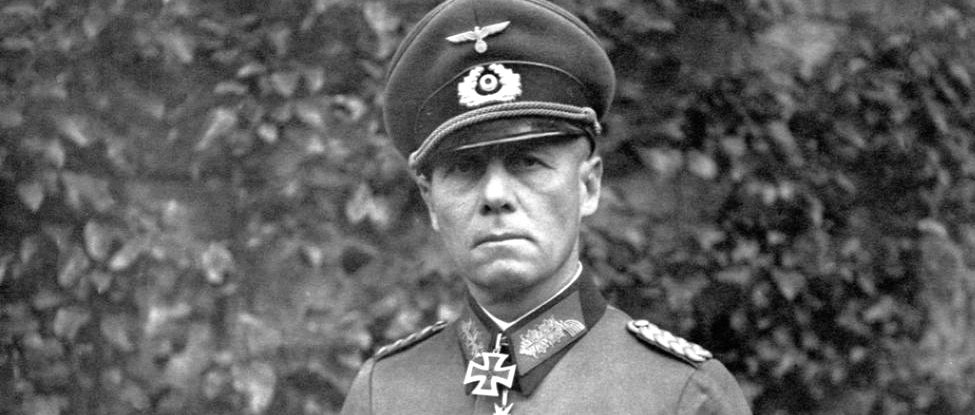After meeting Manfred Rommel, the son of legendary World War II German field marshal Erwin Rommel, I realized that yesterday’s enemies can be today’s friends.
Or to put it another way, Germans are not intrinsically hostile to Jews.
Far from it.
Manfred Rommel, who died a few days ago at the age of 84, was a three-term mayor of Stuttgart — a major city in southwestern Germany — a proponent of German-Jewish reconciliation and a friend of Israel.
I met him in Stuttgart in the spring of 1989, when I was in Germany on a reporting assignment. I wanted to interview him because he seemed to represent a liberal and cosmopolitan voice in German politics. Certainly, he was light years away from the close-minded ethnocentrism and militarism of his father’s generation.

Rommel greeted me warmly as I entered his spacious office, but as he reflected on his father’s legacy, he was cool and dispassionate.
One of my first questions was purely hypothetical.
What would have happened had his father — the commander of the Afrika Korps — defeated his British counterpart, Bernard Montgomery, at the Battle of El Alamein, captured Egypt, swept across the Sinai Peninsula and driven into Palestine?
His answer was surprisingly candid, not what I expected.
“I’m very glad the German army didn’t reach Jerusalem,” he said. “It would have been disastrous for the Jews of Palestine.”
He speculated that Nazi killing units, known as Einzatzgruppen, would have attempted to destroy the Yishuv, the Jewish community in Palestine.
Rommel claimed that his father was not an antisemite, but acknowledged that he had accepted the anti-Jewish policies of Adolf Hitler’s regime. “We should face history as it is,” he said. “From Hitler, you can learn how people can be seduced by propaganda and be morally corrupted.”
Nonetheless, in the summer of 1942, his father burned an order from Berlin to kill captured soldiers, whether or not they were Jewish.
Upon returning to Germany from North Africa, Rommel said, his father met Hitler and told him that antisemitism had not been “helpful” to the German cause. Hitler was not impressed. ‘You don’t understand anything about politics,’ Hitler said. “My father didn’t understand that antisemitism was a driving force in Hitler’s world view.”

Recalling his father with affection, Rommel said they had “a strong emotional relationship.”
Rommel last saw him in the autumn of 1944 as two generals escorted him to a waiting car. Accused of conspiring against Hitler, he was given a stark choice: commit suicide or face a rigged trial at which he would be convicted of treason and then executed. He swallowed a cyanide tablet and died almost immediately.
According to Rommel, his father was not involved in the July 1944 plot to assassinate Hitler. “He opposed it, fearing that, in death, Hitler would become a martyr. He thought the (anti-Nazi) resistance leaders were dreamers.”
He believes his father fell out of Hitler’s favor before 1944. As he put it, “He became very pessimistic after Germany declared war on the United States. He was against the strike into the Soviet Union. He knew the war was lost after the Normandy invasion.”
His father thought that Germany should engage the Allies in negotiations to end the war, he added.
Claiming his father learned about the Holocaust only after his return from the campaign in North Africa, Rommel said, “In Africa, he had been cut off from the news. He didn’t know the full truth.”
Gen. Johannes Blaskowitz informed his father about the genocidal aspect of the war, and he was flabbergasted. “This mass killing was so extraordinary. He didn’t think it was possible.”
Even Jews being deported to extermination camps in Poland could not have conceived of such a monstrous crime, he noted.
Ruminating on the Holocaust, Rommel said that “psychotic patriotism” and “great manipulation” were among the factors that made the Holocaust possible.
Reflecting on the Nazi era, Rommel said that Germany’s crimes against humanity should not prevent reconciliation between Germans and Jews: “We should not be deterred by the past from our present and future tasks.”
In this spirit, Rommel launched a program under which former Jewish residents of Stuttgart were invited to visit the city on free trips. “Many Jews had left Stuttgart in such sad circumstances,” he mused, referring to Nazi times.
Rommel visited Israel quite frequently and was always struck by its vitality. And when he met German Jews in Israel who had settled in Palestine in the 1930s, he was always surprised by the depth of their strong “emotional ties” with the German language and culture.
Toward the end of our meeting, Rommel declared that Germans today should accept full responsibility for the terrible events their parents and grandparents had unleashed. And in an aside, he said, “It’s much better that Germany, under Hitler, lost the war. There should be no support for the opinion that Germany should have won the war.”
As I left his office, I observed how ironic it had been that I, the son of Holocaust survivors, had just interviewed the son of Nazi Germany’s most illustrious soldier.
Rommel, a wan smile on his face, countered: “It`s a sign that times have changed for the better.”
I fully agreed with his assessment.
